Search
Results for 'insurance'
Clear-
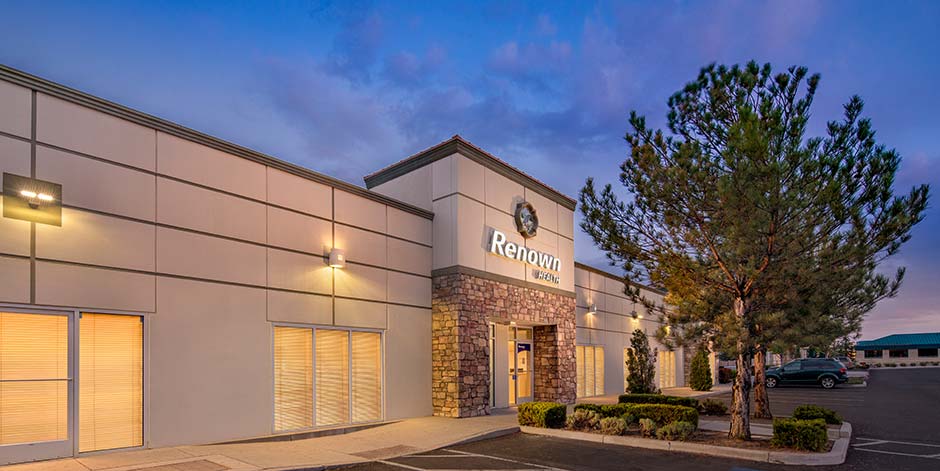 Renown Institute for Heart & Vascular Health - South CarsonRenown Institute for Heart & Vascular Health - South CarsonHours
Renown Institute for Heart & Vascular Health - South CarsonRenown Institute for Heart & Vascular Health - South CarsonHours
Wed8 a.m. - 4 p.m.Thu-TueClosed -
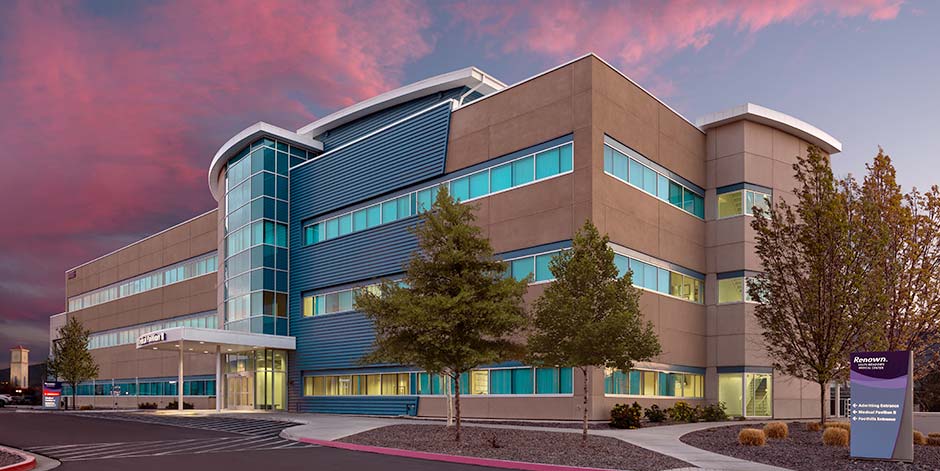 Renown Institute for Heart & Vascular Health - Double RRenown Institute for Heart & Vascular Health - Double RHours
Renown Institute for Heart & Vascular Health - Double RRenown Institute for Heart & Vascular Health - Double RHours
Mon-Fri8 a.m. - 5 p.m.Sat-SunClosed -
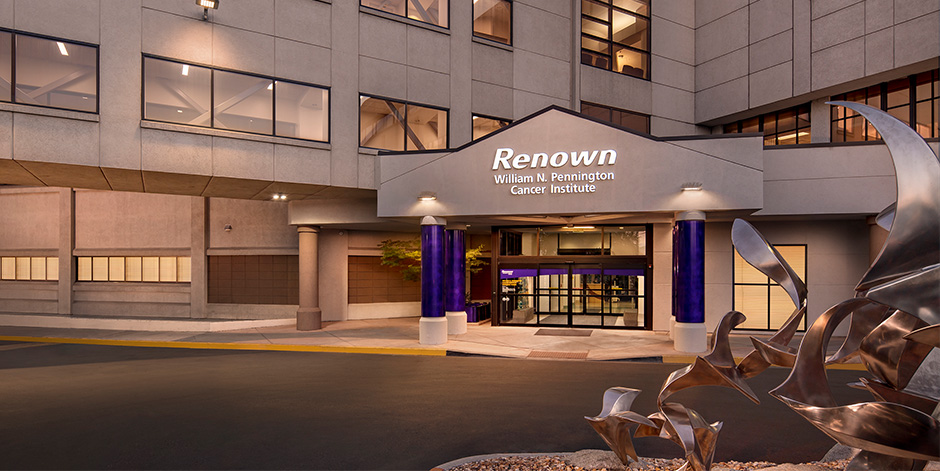 William N. Pennington Cancer InstituteWilliam N. Pennington Cancer InstituteHours
William N. Pennington Cancer InstituteWilliam N. Pennington Cancer InstituteHours
Mon-Fri7 a.m. - 4:30 p.m.Sat-SunClosed -
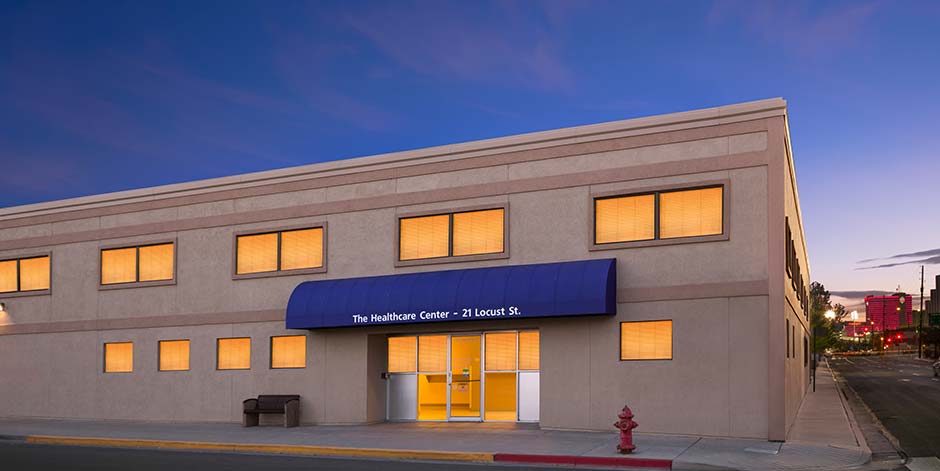 Genetic ResearchGenetic ResearchHours
Genetic ResearchGenetic ResearchHours
Mon-Fri9 a.m. - 5 p.m.Sat-SunClosed -
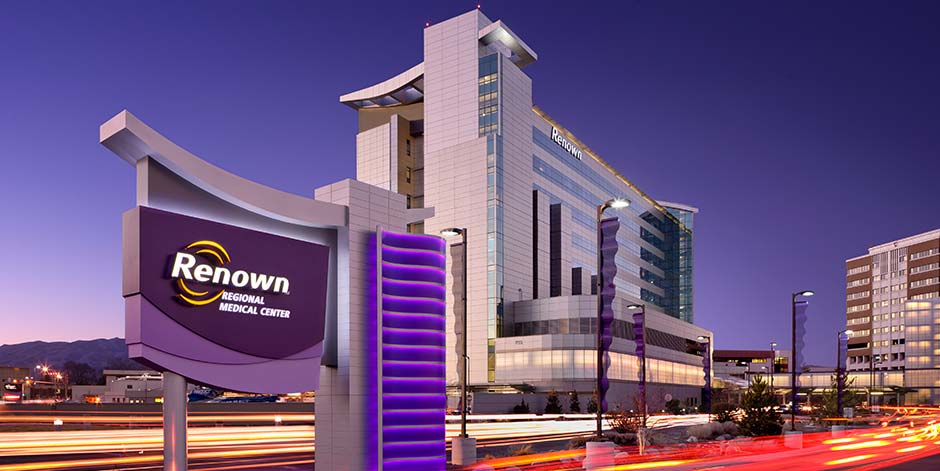 Renown Institute for Robotic SurgeryRenown Institute for Robotic SurgeryHours
Renown Institute for Robotic SurgeryRenown Institute for Robotic SurgeryHours
Mon - Fri5 a.m. - 9:30 p.m.Sat-SunClosed -
UnitedHealthcare & Renown Health Announce New Contract Agreement
New contract provides members with continued in-network access to all Renown hospitals and physicians UnitedHealthCare and Renown Health today announced they have reached an agreement on a new contract. The agreement protects affordability and value-based care, and provides UnitedHealthCare members with continued in-network access to all Renown hospitals and physicians. Renown Health President and CEO, Anthony Slonim, M.D., DrPH, FACHE, stated, “We appreciate the collaborative approach of both teams to reach resolution. As Nevada’s most preferred health system and Reno’s only not-for-profit health care organization, our mission is to make a genuine difference in the health and well-being of the community. As doctors, nurses and caregivers, we want to ensure the greatest access, experience and highest quality care for every member of our community, including those insured by UnitedHealthCare. Today’s agreement marks another important milestone in achieving the goals of our strategic plan and a healthier Nevada.” United contracts for all Renown Health services had terminated on June 1. The Health Plan of Nevada (HPN) contract remains to be negotiated and finalized. Consumers with questions can contact United by using the toll-free number on the back of their current United identification card. ### About Renown Health Renown Health is a locally governed, not-for-profit integrated healthcare network serving northern Nevada, Lake Tahoe and northeast California. Renown is one of the region’s largest private employers with a workforce of more than 7,000. It comprises three acute care hospitals, the region’s only children’s hospital, a rehabilitation hospital, the area’s most comprehensive medical group and urgent care network, and the region’s largest and only locally owned not-for-profit insurance company, Hometown Health. Renown has a long tradition and commitment to continually improve the care and the health of our community. For more information, visit renown.org.
Read More About UnitedHealthcare & Renown Health Announce New Contract Agreement
-
Renown Regional Medical Center Recognized Among Nations Top Hospitals In Critical Care
The region’s only trauma center receives top honors from Healthgrades What is Healthgrades? Healthgrades, a leading national resource for trusted information about physicians and hospitals, recently announced the recipients of their 2021 Specialty Excellence Awards. These awards recognize hospitals with superior performance and have selected Renown Regional Medical Center in Reno, Nv. as northern Nevada’s top hospital for critical care. Hospitals in this ranking demonstrate excellent patient clinical outcomes in treating pulmonary embolism, respiratory system failure, sepsis, and diabetic emergencies. Health grades further distinguishes hospitals that stand out as America’s 100 Best Hospitals for Specialty Care™, with Renown Regional Medical Center identified as Nevada’s only critical care hospital to be bestowed with this honor. What this Award Means To Us “At Renown, I am honored to work beside dedicated healthcare heroes who are working tirelessly to make a genuine difference in the health and well-being of every patient and family we serve,” says Tony Slonim, MD, D.Ph., FACHE, president and CEO of Renown. “Having trained and served as a pediatric intensive care physician, this honor from Healthgrades does so much to recognize the compassion, skill, and determination of this incredible team. I join with our community in saluting the Renown Regional Medical Center’s critical care team as one of the best critical care hospitals in the nation.” “As the only accredited trauma center between Sacramento and Salt Lake City, we receive and care for critically-injured patients from over 100,000 square miles. Our communities depend on Renown Regional Medical Center for outstanding critical care,” says Dawn D. Ahner, DSc, FACHE, Chief Operating Officer, Acute Services. “Our multi-disciplinary critical care and intensive care healthcare teams are specially-staffed, equipped and designed to care for, closely monitor, and comprehensively care for patients with life-threatening conditions.” “Having a specialty-trained team of physicians, nurses, respiratory therapists, care managers, physical and occupational therapists around the clock, every day ensures that, no matter the illness or injury, a patient will be treated with the highest degree of care right away,” says Paul Sierzenski, MD, MSHQS, CPE, FACEP, Chief Medical Officer, Acute Services. “What it comes down to is this; the quicker and more accurately you get treated, the better your outcome will be. That's what makes being one of the most respected critical care teams in the country, so vital to all of us.” “At Renown, we have done so much over the years, to prepare to meet the need for rapid surges in critically ill or injured patients. Through this pandemic, many patients suffering from complications of COVID-19 have needed intensive care services,” says Erik Olson, MHA, Chief Executive Officer of Renown Regional Medical Center. “As the demand for critical care and intensive care continues to increase, the ratio of ICU beds to hospital beds will continue to rise as the ICU occupies an ever-larger role at the center of acute hospital care. We appreciate the recognition from Healthgrades demonstrating the Renown team’s unwavering commitment to the highest level of patient care and safety.” About Renown Health Renown Health is the region’s largest, locally owned and governed, not-for-profit integrated healthcare network serving Nevada, Lake Tahoe, and northeast California. With a diverse workforce of more than 7,000 employees, Renown has fostered a longstanding culture of excellence, determination, and innovation. The organization comprises a trauma center, two acute care hospitals, a children’s hospital, a rehabilitation hospital, a medical group, an urgent care network, and the region’s largest, locally owned not-for-profit insurance company, Hometown Health. Renown’s institute model addresses social determinants of health and includes Child Health, Behavioral Health & Addiction, Healthy Aging, and Health Innovation. Clinical institutes include Cancer, Heart, and Vascular Heath, Neurosciences, and Robotic Surgery. Renown is currently enrolling participants in the world’s largest community-based genetic population health study, the Healthy Nevada Project®. For more information, visit renown.org. About Healthgrades Healthgrades is dedicated to empowering stronger and more meaningful connections between patients and their healthcare providers. At Healthgrades, we help millions of consumers each month find and schedule appointments with their provider of choice. With our scheduling solutions and advanced analytics applications, we help our health system and life sciences clients cultivate new patient relationships, improve patient access, and build customer loyalty. At Healthgrades, better health gets a head start.
-
Alzheimer's Safety Tips for Caregivers to Know
November is National Alzheimer’s Disease Awareness Month. At Renown Health, we know that Alzheimer's safety for your loved one is a priority, as the symptoms can sometimes lead to unsafe situations. We asked Dr. Jonathan Artz – a neurology physician with Renown Health and an assistant professor of clinical neurology at the University of Nevada, Reno School of Medicine – for tips on keeping loved ones safe and secure. According to the Alzheimer’s Association, Alzheimer’s disease affects safety in various ways, specifically due to body and brain adjustments. These changes can include: Judgment, including forgetfulness Sense of place – getting lost on the way home Behavior – being suspicious or fearful Body difficulty – losing balance Sensing ability – noticeable sensitivity in hearing, seeing or temperature Dr. Artz gives us four major tips to ensure your loved one’s safety as you both navigate this disease together. Watch for Wandering Those experiencing Alzheimer’s disease tend to wander and get lost. Try the following tips to reduce the risk of wandering: Get your loved one an ID bracelet and have them wear it at all times. You can also enroll your loved one in “Wandering Support.” Install door chimes so you know when exterior doors are open. Ask neighbors to call you if they see your loved one out alone. Go with your loved one when they insist on leaving the house. Don’t argue or yell. Instead, use distraction or gentle hints to get them to return home. Discourage Driving Driving can be unsafe for someone with this disease. With this in mind, ask a doctor whether it’s safe for your loved one to drive. For example, on a case-by-case basis, there are certain situations where doctors are required to report individuals with particular cognitive impairments, wherein a form of a driving assessment will be recommended. Limit access to the car. Keep the keys with you or lock them away. Ask an authority figure, such as an insurance agent or a doctor, to tell them not to drive. Adult-Proof Your Abode A simple living space is a safe living space. This means reducing clutter and removing any issues that may pose a safety concern. You may also want to get advice from an occupational therapist (home safety expert). Keep in mind that some changes may not be needed right away. Focus on major safety concerns first. Try the following tips: Add lighting (or glow-in-the-dark tape) to brighten dark areas, including stairways and halls. Use color contrast or texture indicators for dials, knobs and appliance controls. Remind your loved one not to carry items while walking to avoid a fall. Remove sharp objects from drawers and countertops. Avoid using small throw rugs or doormats, as they are easy to trip on. Move frequently used items so that they are easy to reach. Lock away alcohol and tobacco products, as they are not recommended for dementia patients. Install handrails in the shower, tub and near the toilet. Bathroom falls are especially common. Adjust the setting on your hot water heater so water does not scald. Those with Alzheimer’s can lose their sensitivity to temperature. Move and lock up hazardous chemicals and cleaning supplies, such as bleach and insecticides. Disable and remove guns or any weapons. Supervise any medication taken by your loved one. Promote a Positive & Healthy Lifestyle Continually emphasize the strengths of your loved one by promoting participation in meaningful activities, wellness visits and healthy habits to help them improve their well-being. Here are some ways to keep them physically and mentally active: Maintain regular vision and hearing screenings and make necessary adaptations. Establish a routine for daily activities. Encourage participation in self-care and leisure activities. Work with your loved one’s doctor to establish a healthy diet. Ensure proper hydration. It may help to set reminders for your loved one to drink fluids. Encourage regular exercise. Exercise delivers oxygen to the brain, improving brain health. Promote good sleep habits. Good quality sleep can increase overall brain health and has been associated with improving memory, attention and concentration. Resources and support are available with the Renown Memory Disorders Program. Providers within this program are specifically dedicated to treating several different memory-related disorders. Memory Disorders Resources & Support.
Read More About Alzheimer's Safety Tips for Caregivers to Know
-
Navigating Pain with Renown Spine, Sports & Pain Management
Chances are you or someone you know will deal with chronic pain at some point in life. In fact, in the U.S. alone, one in five adults have experienced chronic pain in recent years, according to the Centers for Disease Control and Prevention (CDC). The road to relief is a frequently traveled one that can be filled with twists and turns, so it’s important for patients to have a trusted provider by their side navigating that journey. We interviewed Dr. Sharlene Su, a pain management physician with Renown Medical Group, who told us what patients can expect when seeking care with Renown Spine, Sports & Pain Management (RSSPM) and all about the variety of pain relief options available to patients. What pain management treatment options are available outside of painkillers? This depends on someone’s root cause of pain. For example, for pain from arthritis of the spine or major joints, radiofrequency ablation can relieve most of the pain for six months to two years, which can be life changing. If someone is suffering from a pinched nerve in the neck or back, an epidural can be useful. Nerve stimulators can also be a great option to relieve pain for years. One of the advantages of the procedures we perform at RSSPM is that they reduce the need for painkillers, which are notorious for having side effects of their own. Physical therapy can also be a very helpful tool to treat pain. It is an exciting time in the field of pain medicine right now because new advances are -constantly being made. At Renown, we pride ourselves on staying current with the most cutting-edge treatments to ensure our patients always have the best available to them. What are some at-home tips and tricks that patients experiencing pain can do on their own for some relief? If pain is related to posture or physical activity, consider doing stretching and strengthening exercises. YouTube can be a great (and free) resource for this. In terms of medications, over the counter topical pain creams can be great. Tylenol is one of the safest pain medications for those without preexisting liver conditions. On a short-term basis, anti-inflammatory medications can often be used safely depending on one’s overall health. Ice and heat can both be useful for treating muscle pain. Can you tell us more about the services Renown Spine, Sports & Pain Management offers? Our team specializes in identifying the root cause of each patient’s pain and partnering with them to develop a custom plan tailored to their individual needs, which can involve injections, physical therapy and medications. We treat patients ranging from top-level athletes, to weekend warriors, to grandparents who’d like to be able to keep up with their grandkids. Once we relieve a patient’s pain, our role then transforms into a coach, educating and guiding our patients on how to prevent their pain from coming back. At RSSPM, you’ll see the same doctor every time, which means that your provider will get to know you very well, and you’ll receive the same high-quality consistent care whenever you come for a visit. Renown has a unique pain management team called “Special Procedures” that not many people may realize is a great option for care. How does this team treat pain? Our Special Procedures team is crucial to the high-quality pain management care that we provide. We have an amazing staff that assists with X-ray guided procedures including epidurals, radiofrequency ablations, joint injections and nerve stimulators. Dr. Casey Keating, our division chief, and I work with this team to ensure that every procedure is done with the same precision, attention to detail and quality. The Special Procedures team regularly receives feedback from patients on how well taken care of they felt during their procedure. If someone is experiencing pain from an injury or even an unknown reason, what should they do to get care for their concerns? Contact your primary care provider for a referral to have an evaluation with us! RSSPM accepts most insurance plans and are proud that our wait times are averaging less than one week to be seen as a new patient. Two more doctors will be joining us in the next few months, which should reduce our wait times even more. There are so many targeted and effective ways to treat pain nowadays, and it is worth addressing to live the life you want to live.
Read More About Navigating Pain with Renown Spine, Sports & Pain Management
-
Testosterone, Men and Health: What You Need to Know
You probably know testosterone (T) plays an important role in how boys physically develop into men. But is that all you know? What happens when a man's T levels are off? Are there symptoms men should look for? And what are the treatment options? Dr. Bobby Kahlon, MD, Renown Medical Group provides answers in a Testosterone Q&A. What does testosterone do for men? "Testosterone is known as the 'manly hormone' for a reason," says Dr. Kahlon. "Though women also naturally produce small amounts of it, men produce testosterone at much higher concentration levels. And it affects men in more physical and obvious ways. How much hair a man has on his chest, how deep his voice is, or how muscular he is are all attributable in some way to testosterone. It's also responsible in large part for sex drive and bone strength and affects how men think, learn and experience their surroundings." Testosterone in men: Powers virilization (male physical characteristics) and sexual function Builds muscle mass and strength Supports bone density Improves cognition T Trivia: Discover Magazine reveals that “manly” testosterone and other sex hormones evolved long before we did — 500 million years ago — from the ultimate “female” hormone, estrogen. Can you have too much or too little testosterone? Though high testosterone isn't a concern for most men, low testosterone or low T occurs more frequently and develops for two primary reasons. Dr. Kuhadiya explains, "Subnormal testosterone concentrations occur either due to pituitary or testicular failure and the causes for each need to be discussed with your physician." Pituitary failure: Approximately one-third of men with obesity, type 2 diabetes, or metabolic syndrome (which includes increased blood pressure, high blood sugar, excess body fat around the waist, and abnormal cholesterol or triglyceride levels) have low free — or "bioavailable" — testosterone. These health conditions can cause the pituitary gland to "fail" to release follicle stimulating hormone (FSH) and luteinizing hormone (LH) which are essential for triggering testosterone and sperm production. And that can cause low testosterone (hypogonadism). Testicular failure: Though less common than pituitary failure, testicular failure may also be responsible for low T. It's caused by diseases or illnesses affecting the testicles, injury or trauma to the testicles, or certain medicines and treatments such as chemotherapy or opioid pain medication. Providing your complete medical history to your doctor is always the first step toward a proper diagnosis. What are the symptoms of low T? The following indicators could be a sign that you have low T, say the doctors. Lack of motivation and determination, including mild depression Loss of physical endurance and muscle strength Loss of or diminished early morning erections Reduced libido (sex drive) Erectile dysfunction (ED — difficulty achieving or maintaining an erection) Gynecomastia (male breasts) Small testes T and Time: T levels in men naturally begin to decline by about 1% a year starting at age 30. How do you test for low T? "There are different methods for testing testosterone levels," says Dr. Kuhadiya. "Each approach uses a blood sample to evaluate total testosterone, which includes free and attached testosterone that combines with proteins albumin and sex hormone-binding globulin (SHBG). For the most accurate results, testing is based on samples collected in the morning after fasting, and from tests on two different days." What treatment options are available? "Well, your best natural option may be YOU," says Dr. Kahlon. "Men with pituitary failure are often able to treat their low T by losing weight to increase levels of the hormone. And even if you don't lose weight, exercise can help boost your testosterone. Unfortunately, if you have testicular failure, weight loss and exercise may not have the same effect." So, are there other options? "You may want to consider Testosterone Replacement Therapy (TRT)," says Dr. Kuhadiya. "TRT is only available to men who are hypogonadal — with a clinical diagnosis of low T. Injection, gel, skin patch and nasal spray are available TRT options. The best option is the one that works best for the patient. Convenience, insurance coverage and cost are all factors to consider." Dr. Kahlon's TRT preference? Daily gel treatments, which are applied directly to the skin. On the other hand, Dr. Kuhadiya recommends intramuscular injections, which take place once a week or every two weeks. But both doctors agree on this: physicians and their patients need to weigh the benefits and risks of TRT before proceeding with treatment — especially if your low T condition may require lifelong treatment. "In my clinical practice, I have seen some very good long-term results with an improved quality of life," says Dr. Kuhadiya. "However, in certain situations, TRT may increase the risk of heart disease and is not recommended for men with a history of prostate cancer." Dr. Kahlon adds, "Patients receiving any type of hormone therapy need to be closely monitored throughout the treatment process for any changes in their health." How do you feel about steroids and T boosters? "I don't recommend them, certainly not for hypogonadism," advises Dr. Kahlon. "There is no evidence to support anabolic-androgenic steroids or testosterone boosters as a safe or effective treatment for low T in men." "In fact, there continues to be emerging evidence they may lead to side effects that could potentially harm the liver and the pituitary and endocrine functions of the body," warns Dr. Kuhadiya. "And that damage may be irreversible."
Read More About Testosterone, Men and Health: What You Need to Know



